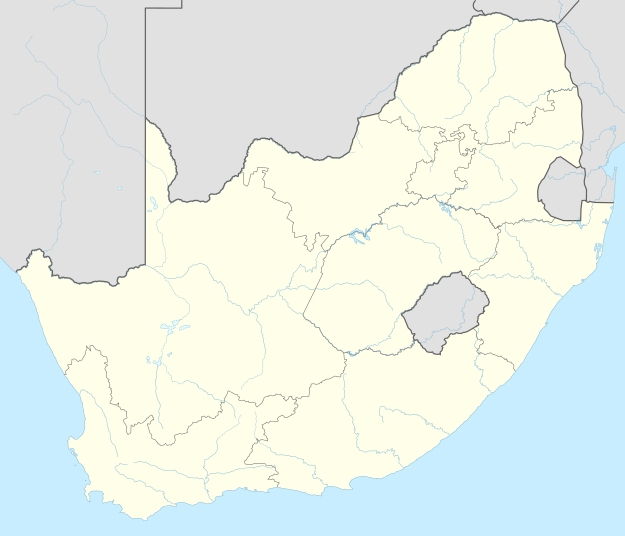Battle of Kakamas
The battle of Kakamas took place in Kakamas, Northern Cape Province of South Africa on 4 February 1915. It was a skirmish for control of two river fords over the Orange River between contingents of a German invasion force and South African armed forces. The South Africans succeed in preventing the Germans gaining control of the fords and crossing the river.
Prelude
South Africa had assembled a force of 6,000 men in Upington and Kakamas, under the command of Colonel J. van Deventer. Deventer's men were to form one of the columns in a planned invasion of German South West Africa. In a pre-emptive move German Schutztruppe under the command of Major Ritter invaded South Africa.[1]
Battle
Ritter attacked Kakamas on 4 February 1915, hoping to capture two Orange River fords and head south further into South Africa. A fierce skirmish developed with the Germans being beaten back, with the loss of seven dead, sixteen wounded and sixteen taken prisoner.[1][2][3][4]
Aftermath
Following the battle van Deventer called up the rest of his column from Upington, 80 kilometres away, crossed the Orange River and proceeded to advance slowly into South West Africa.
Memorial
Just outside the town, in the town's cemetery, there is a memorial dedicated to the German soldiers killed in the battle.[5]
See also
- Battle of Keimoes June 1901 during the Second Boer War
- Maritz Rebellion or the Boer Revolt occurred in South Africa in 1914 at the start of World War I.
References
- Willcox, A. R. (1986). Great river: the story of the Orange River, Drakensberg Publications, ISBN 0-620-09845-7, ISBN 978-0-620-09845-8 p. 84
- Olivier, Sandra (2005) Touring in South Africa, 2nd Edition, Struik, ISBN 1-77007-142-3. p. 164
- Exploring our Provinces: Northern Cape, Volume 8, Jacana Media, ISBN 1-77009-267-6. p. 62
- Reader's Digest illustrated guide to Southern Africa, Reader's Digest Association South Africa (Pty.), ltd. in association with T. V. Bulpin, 1978, p. 183
- Reader's Digest illustrated guide to southern Africa, 2nd Edition, Reader's Digest Association South Africa, 1980, ISBN 0-620-04650-3, ISBN 978-0-620-04650-3
Further reading
- "Agter Die Skerms met Die Rebelle" by C. F. McDonald, (1949)
- 1. Boer Rebels and the Kaiser,s Men and 2. Kakamas: von Hadeln's reconnaissance section, Die Boervolk van SA, 25 August 2009.
- Karl Waldeck: "Gut und Blut für unsern Kaiser", Windhoek 2010, ISBN 978-99945-71-55-0
- Historicus Africanus: "Der 1. Weltkrieg in Deutsch-Südwestafrika 1914/15", Volume III, "Kämpfe im Süden" (Das Gefecht bei Kakamas), Windhoek 2014, ISBN 978-99916-872-8-5
